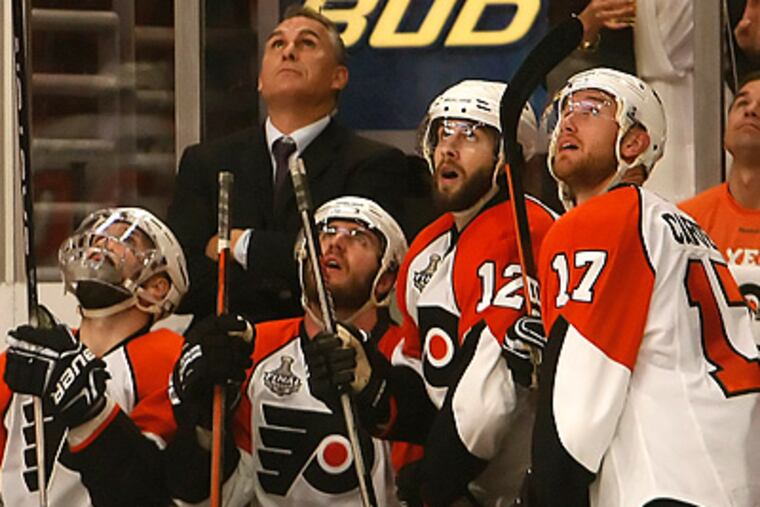Phil Sheridan: Speedy Hawks take first heat in a track meet
CHICAGO - The Flyers aren't the first people to get windburn in the Windy City. In Game 1 of the Stanley Cup Finals, they did precisely what their captain said they could not do. They got into the "track meet" Mike Richards warned against with the speedy and skilled Chicago Blackhawks. For a period, they had the lead. For two periods, they kept up.

CHICAGO - The Flyers aren't the first people to get windburn in the Windy City.
In Game 1 of the Stanley Cup Finals, they did precisely what their captain said they could not do. They got into the "track meet" Mike Richards warned against with the speedy and skilled Chicago Blackhawks. For a period, they had the lead. For two periods, they kept up.
In the third period, they got lapped. The Blackhawks only scored one goal in that final period, but they controlled play, pressured Brian Boucher relentlessly and outshot the Flyers 8-2 up until getting the game-winner.
"We had more speed," Blackhawks coach Joel Quenneville said. "That's the standard we want to move off going into next game."
The Flyers allowed themselves to be seduced into playing the Blackhawks' freewheeling, fast-paced style of game. They did a better job at it than you might have expected, but it's something they can't continue doing if they hope to win this series.
"We obviously think their weakness is their defense," Flyers goaltender Michael Leighton said. "We're going after their D. We're giving up a little more defensively than we want to give up. That's not our team."
It wasn't up - until now. It can't be - starting now.
With apologies to Doc Halladay, the Flyers' version of a perfect game - zero penalties - was not such a good thing. While they didn't want to give Chicago's power play too many chances, the Flyers might have been too cautious. They have to wear the Blackhawks down physically, not by trying to skate with them. That will mean taking some penalties.
Of course, maybe it's a simple case of not being able to hit what you can't catch.
It will take time for the fallout from Game 1 to settle and for the full damage to be assessed. Leighton was an obvious casualty. So was the Flyers' ability to play coach Peter Laviolette's aggressive system against a team capable of turning every small mistake or careless play into a fast break the other way.
Braydon Cobourn let a pass trickle by him during a first-period power play and the Blackhawks' Dave Bolland scored on the gimme breakaway.
Chris Pronger pinched along the boards in the second period, was beaten to the puck by Troy Brouwer, and that led to a break by Patrick Sharp. He fired a tracer that beat Leighton's glove.
The last two goals allowed by Leighton were the results of defensive lapses. The Flyers were caught in their own zone and allowed themselves to be drawn out of position. Before their defensemen could recover, the Blackhawks were able to get pucks in front to open shooters.
On a good night, Leighton would bail them out. This was not a good night.
This was a track meet and the faster team won.
Richards was right about something else, too. He said it wouldn't take long for what Danny Briere called "the hate" to develop between these two unfamiliar foes. The stakes are so high, the intensity so great, that there was a series' worth of stickwork and grudge-building.
The matchup between Pronger and 257-pound Chicago forward Dustin Byfuglien lived up to its hype. In one sequence, Byfuglien planted in front of Leighton. Pronger got in behind him and perpetrated several misdemeanors (by today's NHL rules, anyway) to harrass Byfuglien, who finally relented. The puck came to him and he raced around to the opposite side of the net.
Pronger was waiting for him.
"What'd he do tonight?" Pronger said, shoving aside a question. "Next question."
After whistles, Flyers took turns getting little shoulder bumps and shoves into Byfuglien. Arron Asham, then Scott Hartnell, sent the message that it will be a long series for the linebacker-sized forward. Richards delivered a big hit on Byfuglien later, separating him from the puck at some cost to the captain.
But the same question nags: Can the 35-year-old Pronger take that kind of pounding four, five, six, seven times for 32 minutes? He's always physical. He's always tough. But there's no way he can bang on Byfuglien without it taking a toll.
The Flyers clearly belong in this series. They got goals from Asham and Blair Betts, the kind of deep scoring that is so important when the other team is trying to shut down your stars. They got plenty of chances on Antti Niemi, the Chicago goalie who could just as easily have been pulled.
The result was a wild 6-5 shootout with both teams racing up and down the ice.
"It's not the kind of game we want to play against them," Asham said. "We have to tighten up defensively."
It was a game the Flyers could have won. But it was the kind of game they can't keep playing if they want to win this series.